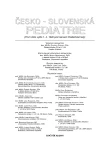Ezetimib – Selective Inhibitor of Cholesterol and Its Application in the Therapy of Familial Hypercholesterolemia in Children and Adolescents
Ezetimib – selektivní inhibitor cholesterolu a jeho využití při léčbě familiárních hypercholesterolémií u dětí a adolescentů*
Úvod:
Hledání nových metabolicky účinných a neškodných hypolipidemik pro léčbu familiární hypercholesterolémie přineslo úspěch ve formě selektivního inhibitoru vstřebávání cholesterolu, který je poprve vyzkoušen i u našich dětí a adolescentů.
Cíl:
Praktické vyzkoušení nového nestatinového léku ezetimibu – selektivního inhibitoru střevní absorpce cholesterolu – pro účinnou léčbu dětské familiární hypercholesterolémie.
Výsledky:
Pětadvacet dětí a adolescentů s molekulárně-geneticky prokázanou familiární hypercholesterolémií bylo úspěšně léčeno ezetimibem v dávce 5 nebo 10 mg/d samostatně nebo v kombinaci se simvastatinem či atorvastatinem (2,5–20 mg/d). U všech pacientů bylo velice snadno dosaženo léčebné hladiny celkového cholesterolu 4,8 mmol/l. U 15 dětí stačilo k normalizaci hladiny cholesterolu pouze podávání samotného Ezetrolu (5–10 mg/d). Žádné nepříznivé účinky během 2leté léčby zatím nebyly pozorovány.
Závěr:
Ezetrol (Schering Plough-MSD) podávaný v dávkách 5 a nebo 10 mg/d samostatně nebo v kombinaci se simvastatinem a atorvastatinem velmi efektivně snižoval zvýšený cholesterol u dětské a adolescentní familiární hypercholesterolémie na léčebnou hladinu. Za 2 roky podávání autoři nepozorovali žádné nepříznivé vedlejší účinky ani změny laboratorních markerů nutrice včetně vitaminů, pohlavních hormonů či somatometrických údajů růstu a hmotnosti.
Klíčová slova:
familiární hypercholesterolémie u dětí a adolescentů, ezetimib, medikamentózní léčba, nestatinová léčba
Authors:
J. Hyánek; V. Martiníková; J. Dvořáková; L. Dubská; F. Pehal
Authors‘ workplace:
Nemocnice Na Homolce, Praha
přednosta prim. MUDr. M. Průcha, PhD.
; Metabolická ambulance, Oddělení klinické biochemie, hematologie, imunologie a molekulární genetiky
Published in:
Čes-slov Pediat 2007; 62 (11): 603-609.
Category:
Original Papers
Overview
Introduction:
The search for new metabolically effective and harmless hypolipidemic drugs for the therapy of familial hypercholesterolemia proved to be successful in finding a selective inhibitor of cholesterol absorption, which was tested in our children and adolescents for the first time.
Objective:
Practical testing of a new non-statin drug ezetimib – a selective inhibitor of intestinal absorption of cholesterol – for efficient therapy of the child familial hypercholesterolemia.
Results:
Twenty-five children with familial hypercholesterolemia demonstrated by molecular genetic methods were successfully treated with ezetimib at the dose of 5 or 10 mg/d as monotherapy or in combination with simvastatin or atorvastatin (2.5 to 20 mg/d). In all patients the therapeutic level of total cholesterol of 4.8 mmol/l was easily reached. In 15 children Ezetrol (5 to 10 mg/d) alone was sufficient for cholesterol levels to become normal. No unfavorable effects have been observed during the two years of therapy.
Conclusion:
Ezetrol (Schering Plough-MSD) administered at the dose of 5 or 10 mg/d as monotherapy or in combination with simvastatin or atorvastatin very efficiently decreased the level of elevated cholesterol in the child and adolescent hypercholesterolemia to therapeutic level. Over the two years of administration neither untoward side effects have been observed, nor changes in laboratory markers of nutrition including vitamins, sex hormones or somatometric data of growth and body mass.
Key words:
familial hypercholesterolemia in children and adolescents, ezetimib, drug therapy, non-statin therapy
Labels
Neonatology Paediatrics General practitioner for children and adolescentsArticle was published in
Czech-Slovak Pediatrics

2007 Issue 11
- What Effect Can Be Expected from Limosilactobacillus reuteri in Mucositis and Peri-Implantitis?
- The Importance of Limosilactobacillus reuteri in Administration to Diabetics with Gingivitis
Most read in this issue
- Fragile X Syndrome at the FRAXE Locus: Clinical and Molecular Genetics Diagnosis of Affected Family
- Childhood Obstructive Sleep Apnea
- Ezetimib – Selective Inhibitor of Cholesterol and Its Application in the Therapy of Familial Hypercholesterolemia in Children and Adolescents
- Fever at the Child Age. Emotional Background of Febrile State and Therapeutic Efforts of the Parents
